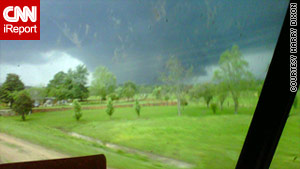Storms kill at least 26 as tornadoes barrel north
- NEW: At least 7 people are killed in North Carolina, the NWS says
- NEW: North Carolina state Rep. Mike Stone reports an additional 2 fatalities in Lee County
- Two rotating storms prompt warnings from Richmond, Virginia, north to Baltimore
- "This is a high-risk day," a CNN meteorologist says
If severe weather happens near you, we want to hear your story. Share your photos and videos with CNN iReport, but please be careful.
See more coverage from CNN affiliate WAPT and WTVD.
(CNN) -- A violent rash of fast-moving storms churned north Saturday, ripping off roofs, toppling trees and pushing the three-day death toll to 26 as possible tornadoes moved into the mid-Atlantic states.
More than 100 twisters were spotted across the region, according to the National Weather Service, which reported seven casualties in North Carolina.
Three people in Raleigh were killed in mobile homes that were destroyed, the weather service said. It reported two people died near Ammon, North Carolina. One person was killed in the Bladenboro area and another in the Benson and Black Creek area, the weather service said.
North Carolina State Rep. Mike Stone reported two additional deaths in Lee County.

Julia Jarema, a spokeswoman for the North Carolina Division of Emergency Management, said the state suffered multiple fatalities but declined to give a specific number.
The "destructive" and "extremely dangerous" tornado had barreled into North Carolina early Saturday evening, prompting emergency warnings for much of the central part of the state.
Two rotating storms triggered tornado watches and warnings up through the Richmond, Virginia, Washington and Baltimore areas, according to the National Weather Service.
CNN affiliate WTVD broadcast images of damaged homes and vehicles in Smithfield, North Carolina, as local residents and emergency workers surveyed the damage.
In South Carolina, a tornado cut through Berkeley County, destroying a church and injuring six people, the weather service said.
 Tornado rips through North Carolina
Tornado rips through North Carolina
 Storm damage near Yarbo, Alabama
Storm damage near Yarbo, Alabama
 Storm causes damage in Mississippi
Storm causes damage in Mississippi
 Video shows tornado on the ground
Video shows tornado on the ground
"We're expecting large violent tornadoes that are going to stay on the ground for a long period of time," said CNN meteorologist Jacqui Jeras. "This is a high-risk day," she added. "We only get a handful of days like this every year."
Meanwhile, emergency crews in Georgia, Mississippi and Alabama worked to assess the damage as the storm system moved north through the Carolinas and up into southern Virginia.
On Friday, Alabama Gov. Robert Bentley declared a state of emergency after reports of tornado touchdowns in at least six counties.
Multiple injuries were reported in Sumter and Marengo counties, with at least one fatality in the latter, he said.
Three people were also killed in Autauga County after fallen trees crashed into mobile homes in the area, police said.
Three additional deaths were reported in Washington County, said Yasamie August, spokeswoman for the Alabama Emergency Management Agency.
Two other deaths were previously reported in Oklahoma and seven in Arkansas.
In Greene County, Mississippi, one death and six injuries were reported, officials said.
Flood warnings were issued across portions of western Alabama Saturday, as earlier rains raised water levels along the Tombigbee River, the weather service said.
Mississippi Lt. Gov. Phil Bryant and Oklahoma Gov. Mary Fallin also declared states of emergency Friday for 14 Mississippi counties and 26 Oklahoma counties, respectively.
But by Saturday, hazardous weather warnings were taken down across the states, the weather service reported.
The city of Clinton, Mississippi, suffered "extensive damage" when a tornado touched down, according to Mississippi's Emergency Management Agency.
The city's mayor said no one was injured in the storm, which tore the roof from a hotel and caused major damage to a bank and numerous homes. It narrowly missed an elementary school and a church daycare center packed with about 650 children between them, she added.
"We have a lot to be grateful for," Mayor Rosemary Aultman said. "It could have been a lot worse."
The storm also tossed cars on Interstate 20, Aultman said.
The tornado in Clinton was one of several reported Friday in Mississippi and Alabama that cut a wide path of destruction.
CNN affiliate WAPT in Jackson, Mississippi, showed video of the destroyed home of a teacher at Hinds Community College.
Several of her students were at the house, helping to clean and salvage what they could from the wreckage.
"I've never seen anything like this," said one student. "My heart dropped because it hurt me to see my teacher's home like this. ... I know it's hurting her, but she's being strong about it."
Numerous power poles were snapped in Jackson along the storm's path, leaving more than 23,400 customers without power, utility company Entergy Mississippi said.
In Alabama, tens of thousands of fans gathered for a weekend of races at the Talladega Superspeedway, which had been under a tornado watch until 9 p.m. Friday
Some 30,000 people camped out, some in tents, on the infield of the speedway, said Steve Dover, spokesman for the Talladega County Emergency Management Agency. Thousands more were seated in the grandstands, he said.
By Saturday, the severe weather had relented, allowing the Superspeedway to open its gates to waiting fans, according to Talladega spokeswoman Hannah Kinderknechd.
A tornado watch remained in effect until 9 p.m. Saturday for eastern North Carolina.
The storms were the latest in a round of severe weather that has hit parts of the Midwest and South since Thursday.
They left a trail of downed trees and power lines, scattered cars and crushed homes as it moved east.
CNN's Ed Payne, Rick Martin and Leslie Tripp contributed to this report
